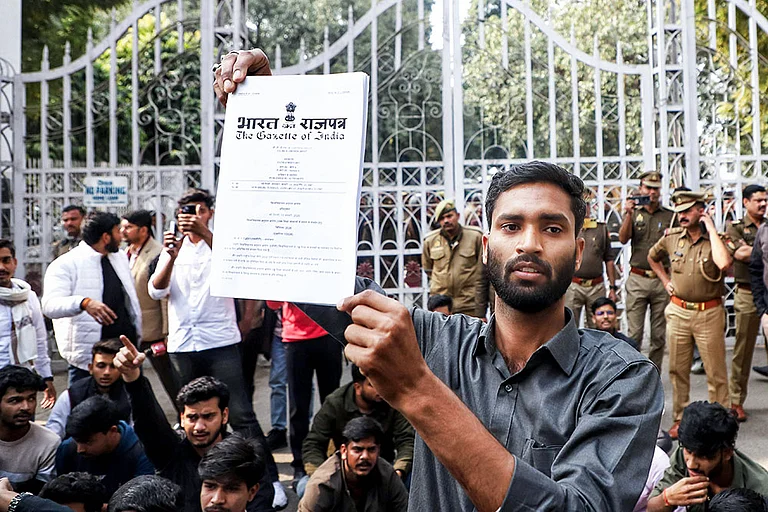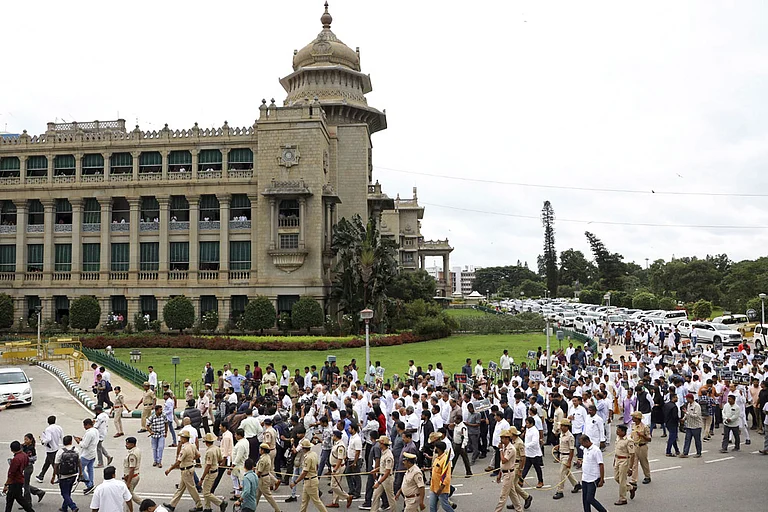
Summary of this article
Chief Minister Siddaramaiah on Friday announced that the state government has fixed the procurement price of sugarcane with 11.25 per cent recovery at ₹3,300 per tonne.
Appealing to the agitating farmers to cooperate and withdraw their protest, Siddaramaiah said the decision was taken after extensive discussions with farmers’ leaders and representatives of sugar factories.
The revised procurement price, he clarified, excludes harvesting and transport charges.
In response to the ongoing protests by sugarcane farmers across northern Karnataka, Chief Minister Siddaramaiah on Friday announced that the state government has fixed the procurement price of sugarcane with 11.25 per cent recovery at ₹3,300 per tonne.
Appealing to the agitating farmers to cooperate and withdraw their protest, Siddaramaiah said the decision was taken after extensive discussions with farmers’ leaders and representatives of sugar factories.
The protest at Gurlapur Cross in Mudalagi taluk, Belagavi district, where farmers have been demanding ₹3,500 per tonne excluding harvesting and transport (H&T) charges, entered its ninth day on Friday. The agitation has spread across the districts of Belagavi, Bagalkote, Vijayapura, and Haveri, among others.
With the protest gaining momentum, the Chief Minister convened a meeting on Friday that lasted nearly seven hours. Addressing the media afterwards, Siddaramaiah said:
“The Deputy Commissioner (DC) and Superintendent of Police (SP) of Belagavi district during their talks with protesting farmers recently had offered ₹3,100 per tonne for sugarcane yielding a recovery of 10.25 per cent, and ₹3,200 per tonne for recovery of 11.25 per cent.”
He added that despite these offers, the agitation continued.
“As the protest has continued despite this offer, today we have taken a decision to pay ₹50 from the factory owners’ side and ₹50 from the government side in addition. That means to say ₹100 in total will be paid in addition to what DC had offered to the farmers, per tonne,” the CM said.
The revised procurement price, he clarified, excludes harvesting and transport charges.
Under the new arrangement, factories have been directed to pay ₹3,200 per tonne upfront, followed by an additional ₹50 per tonne later. The government will contribute another ₹50 per tonne, which is expected to cost the exchequer around ₹300 crore. Officials said that since sugar recovery rates differ from district to district, the price may vary accordingly, but the additional ₹100 per tonne will remain constant. Details will be outlined in an upcoming Government Order.
When asked whether the farmers were satisfied, Siddaramaiah said “I hope so... I appeal to them to withdraw their protest by accepting the new price.”
He further mentioned that while most factory owners had agreed to the decision, a few expressed reservations. “I have asked them to cooperate to help the farmers in distress,” he said.
Following the Chief Minister’s announcement, scenes of celebration erupted at the Gurlapur Cross protest site, where farmers burst crackers in apparent relief.
Farmers’ leader Chunappa Pujari expressed cautious optimism:
“A formal response will be shared after discussing with the farmers and taking their opinion. The sugar minister and district administration officials should formally communicate to us the government decision, along with some assurances. Till then the farmers will be at the protest site.”
The Chief Minister also acknowledged that sugar factory owners had raised certain issues, and assured them that a separate meeting would be convened soon to address their concerns.
Siddaramaiah further highlighted that broader issues such as the Fair and Remunerative Price (FRP) formula, stagnation in the Minimum Support Price (MSP) for sugar, export curbs, and under-utilisation of ethanol offtake from sugar-based feedstock, fall under the purview of the central government.
“He also said that he will lead a delegation of sugar factory owners, Members of Parliament from all parties to meet the prime minister and concerned Union minister in this regard, to put pressure on them.”
Karnataka currently has 81 sugar factories, including 11 cooperatives and one government-owned unit. Last year, the state produced 5.6 crore metric tonnes of sugarcane, and production is projected to rise to 6 crore metric tonnes this year.
With PTI inputs






















